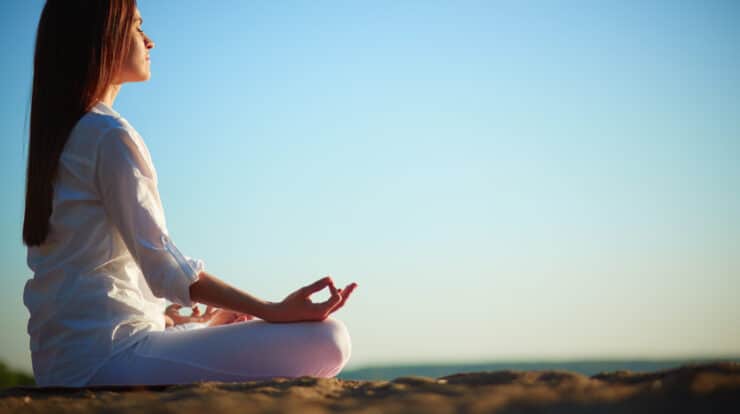
Sleep is an essential part of being healthy. Sleep helps your body recover from the day’s activities, reduces stress levels, improves memory and focus and boosts your immune system. However, getting enough sleep can be difficult for many people. Sleep deprivation can lead to irritability, impaired decision making, decreased productivity and poor health. It is also associated with chronic diseases such as diabetes and hypertension.
How can I get better sleep?
Sleep deprivation can also increase the risk of car accidents, cause job-related errors and reduce our ability to function under pressure. There are many factors that can affect your ability to sleep, including diet, stress levels and caffeine consumption. Even small changes in your behavior can result in better sleep quality and quantity. This article will discuss ways to get better sleep with tips on how to improve your sleep habits.
Create a sleep-friendly environment
Your bedroom should be a place that you enjoy being in and want to spend as much time as possible. Your bedroom should be a quiet and relaxing space where you can relax without being interrupted. This can help you get into a better sleep state and make it easier for you to fall asleep quickly. The following things can help create a sleep-friendly environment:
- Install blackout curtains if you live in a noisy neighborhood. Curtains that are blackout reduce light exposure from artificial lights and will help your room go from light to dark faster.
- Install noise-cancelling headphones or earplugs if you need to sleep with white noise. This can help you sleep better by blocking distracting noises.
- Use an eye mask to help you sleep in complete darkness. An eye mask that is blackout will block any light that enters your room and can make it easier to fall asleep.
Establish a bedtime routine
Establishing a bedtime routine will help make your bedtime more predictable, which can help you fall asleep faster and improve your sleep quality overall. This routine can include anything from taking a bath to reading a book, watching TV, drinking a warm beverage or listening to music. It’s important that this routine doesn’t include work or other activities that may keep you awake. Establishing a bedtime routine will help you get into a sleep state more quickly by triggering your body’s sleep hormones and decreasing your body’s alertness levels. It will also help you fall asleep faster and experience fewer interruptions throughout the night. Some things that can help your bedtime routine:
- Set a consistent bedtime and wake time: Being consistent with your bedtime and waking time will help you get into a consistent sleep state and make it easier to fall asleep.
- Create a relaxing environment: Your bedroom should be a relaxing space where you can relax without being interrupted. This can help you fall asleep faster by triggering your body’s relaxation response.
- Use consistent lighting: Keeping your lighting consistent throughout the day can help you stay in a consistent sleep state. This may mean using lower light levels at night.
- Create a calming environment: Your bedroom should be a place where you feel calm, relaxed and at ease. This can help you get into a sleep state faster by triggering your body’s relaxation response.
- Exercise regularly: Exercise is one of the best ways to improve your sleep. It can help you fall asleep faster, experience fewer interruptions throughout the night and improve your overall quality of sleep.
Exercise regularly
Exercise is one of the best ways to improve your sleep. It can help you fall asleep faster, experience fewer interruptions throughout the night and improve your overall quality of sleep. Exercising regularly can also help you sleep better due to the release of melatonin, a hormone that helps regulate your sleep-wake cycle. Exercising during the day can help you fall asleep faster and experience fewer interruptions throughout the night. It can also help you sleep better by regulating your body’s circadian rhythm.
Exercising can help you sleep better by regulating your body’s melatonin production. It can help you fall asleep faster by triggering your body’s relaxation response. Exercising during the day can also help you sleep better by lowering your levels of cortisol, a hormone that can disrupt your sleep.
Avoid caffeine after 3 pm
Caffeine is a stimulant that can keep you awake and affect your sleep quality. It can interfere with your ability to fall asleep, prevent you from entering a deeper sleep state and cause you to wake up frequently throughout the night. Caffeine is found in many drinks, including coffee, tea and soda.
If you consume caffeine regularly, you may want to avoid it after 3 pm, when your body is in a sleep state. Caffeine can stay in your body for up to 12 hours after you consume it, which means you may not be able to get a good night’s sleep even if you go to bed early.
Get enough sleep
Getting enough sleep each night is important for your health and quality of life. The National Sleep Foundation recommends that adults get between 7 and 9 hours of sleep each night. If you regularly experience daytime fatigue or insomnia, it’s important to see your doctor to rule out any underlying health issues. Your doctor can help you develop a sleep schedule that can help you improve your sleep quality and quantity.
Sleeping for fewer hours than you need can lead to decreased alertness, irritability and impaired decision making. It can also increase your risk for chronic diseases such as hypertension and diabetes. If you regularly experience daytime fatigue or insomnia, it’s important to see your doctor to rule out any underlying health issues.
Conclusion of Getting Better Sleep
Sleep is an important part of being healthy and a healthy lifestyle. Getting enough sleep can help improve your mood, productivity and overall health. It’s important to create a sleep-friendly environment, establish a bedtime routine and exercise regularly to improve your sleep. You should also avoid caffeine after 3 pm and get enough sleep each night to improve your sleep quality.




